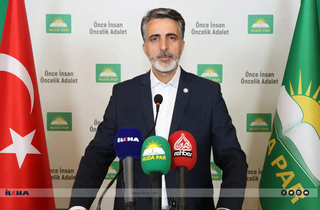Emiroğlu began by drawing attention to the escalating violence in Palestine, citing a report from the United Nations Office for the Coordination of Humanitarian Affairs (OCHA). According to the report, Emiroğlu stated, “The Zionist regime has, since the start of this year, taken the lives of 172 Palestinians, causing immense suffering.” He further added, “Over 7,000 Palestinians in the West Bank have been injured, and 780 houses in East Jerusalem and the West Bank have been demolished. The duty of the United Nations is not to stand by and watch the number of massacres.”
Emiroğlu urged international organizations, especially Turkey and other Islamic countries, to take concrete steps to address the situation and end what he described as “occupation and massacres.”
Turning his attention to a pressing concern closer to Western countries, Emiroğlu expressed grave concern over attacks on Holy Quran, particularly in Sweden and Denmark. These attacks, he noted, were not only authorized by authorities but also carried out under police protection, indicating a disturbing trend of Islamophobia becoming a policy in the West.
Emiroğlu criticized the response of the Islamic world to these provocations, urging the Organization of Islamic Cooperation to take immediate action in line with its founding mission. He declared: “Attacks on our religious values should not be passed over with dry condemnations, but a diplomatic embargo should be imposed until legal action is taken against these dastardly acts.”
Emiroğlu stressed the importance of a robust response to safeguard peace and tranquility, warning that “The enemies of Islam must not dare to carry out these dastardly attacks again.”
In conclusion, Emiroğlu underscored the significance of Türkiye's stance in deterring future attacks on Islamic values. He proposed that Sweden, which he accused of condoning and supporting attacks against Islam, should be denied NATO membership through a vote in the Turkish Grand National Assembly. He warned against making concessions to governments openly targeting Islam, as he believed such actions would only encourage further attacks.
As concerns about Islamophobia and violence in the Middle East persist, Yunus Emiroğlu's statements reflect the urgent need for international attention and action to address these pressing issues. (ILKHA)



 Dünya
Dünya
 Güncel
Güncel
 Güncel
Güncel
 Güncel
Güncel
 Güncel
Güncel
 Dünya
Dünya
 Güncel
Güncel
 Güncel
Güncel
 Sağlık
Sağlık
 Güncel
Güncel





